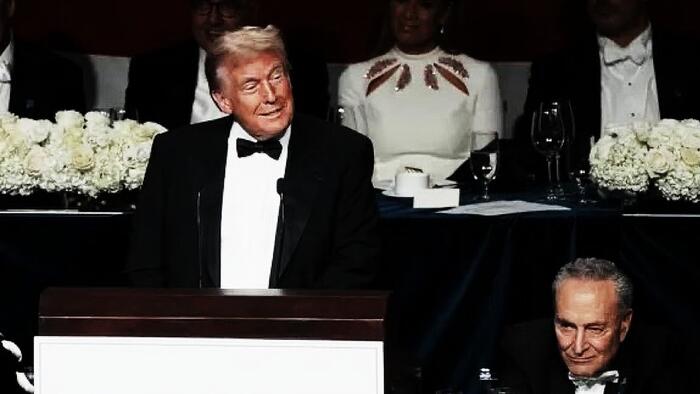The Al Smith dinner in New York City was not just another political event, but an occasion ripe for comedic levity, especially with President Trump stealing the show. Seated beside Senate Minority Leader Chuck Schumer, Trump seized the opportunity to deliver a series of roasts that had attendees and viewers alike in stitches, while undoubtedly leaving Schumer squirming in his chair. The dinner, normally a platform for bipartisan goodwill, took a decidedly humorous turn as Trump sharply targeted the Democrats, cleverly weaving political commentary with punchlines, which heightened the evening’s entertainment value.
As the dinner commenced, Schumer was seen attempting to engage Trump in cordial conversation, seemingly unfazed by the impending comedic onslaught. However, Trump quickly shifted the atmosphere with quips, one of which suggested that if Kamala Harris lost, Schumer could still have the chance to become the first female president—a jab that seemed to hit home. The humor continued as Trump referenced the absence of Minnesota Governor Tim Walz with a twist of sarcasm, indicating he would still claim presence in spirit. It was clear that beneath Trump’s jovial facade lay a strategic plan to undermine his opponents, and Schumer’s increasingly uncomfortable demeanor illustrated the weight of such barbs.
The energy took a sharp pitch as Trump tackled topics such as gender identity, poking fun at Democratic ideals and figures. This particular punchline regarding Tim Walz left Schumer visibly distressed, showcasing how Trump’s brand of humor could easily transform political critique into a source of awkwardness and discontent for the Democrats. Quick to move on with more barbed commentary, Trump took aim at the absent Vice President Harris, who opted to deliver her message virtually, eliciting boos from the crowd. Such reactions highlighted her unpopularity and the audience’s yearning for genuine engagement.
Trump’s jibes regarding Harris provided fertile ground for more humor, suggesting that the Vice President must enjoy private dinners with only her teleprompter for company. This portrayal of Harris not only belittled her public persona but also reflected the broader narrative pushed by Trump and his allies about the perceived ineptitude of the current administration. His humorous critiques persisted as he implied that the U.S. needed new leadership, drawing parallels between Harris’s communication struggles and those of a child. The laughter in the room was a stark contrast to the challenges the Democrats seemed to be facing in the current political climate.
In addition to Trump’s performance, comedian Jim Gaffigan also took the opportunity to poke fun at the Democrats, reinforcing the evening’s tone of lighthearted yet pointed criticism. His remarks underscored a satirical narrative surrounding the Democratic Party’s portrayal of Trump as a threat to democracy, suggesting that if they were truly convinced of this threat, they would have avoided their political missteps. Gaffigan’s zingers were a welcome accompaniment to Trump’s roast, culminating in a night that was both entertaining and politically incisive.
Ultimately, the Al Smith dinner served as more than just a fundraiser; it became a platform for political commentary wrapped in humor. With Trump at the helm of the comedic spotlight, and Schumer and the Democrats as unwitting foils, the event encapsulated the division and rivalry characteristic of American politics today. The sharp exchanges and laughs conveyed the sentiment that, in an increasingly polarized environment, humor remains a potent tool for both critique and connection, even amongst rivals in a politically charged setting.

